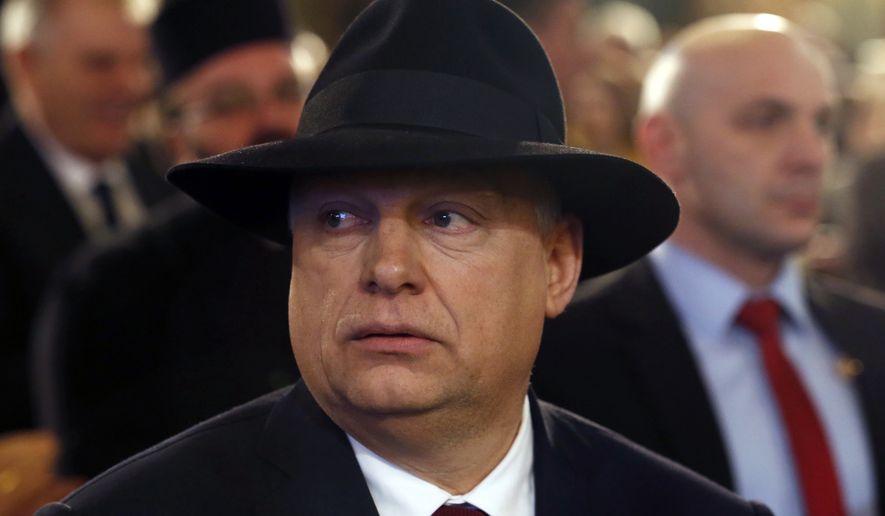BUDAPEST | He was supposed to cruise to victory, but populist right-wing President Viktor Orban and his ruling Fidesz party are sweating out the final days until Sunday’s parliamentary election, with the nationalist Mr. Orban seeking a third consecutive term in office playing off fears of unchecked mass migration to Hungary.
It’s a vote being closely watched across the continent, with Mr. Orban perhaps the best known and most outspoken of a new breed of leaders in central and Eastern Europe challenging the globalist, liberal model pushed by EU officials in Brussels and Western European powers such as Germany and France. Like President Trump in the U.S., Mr. Orban can rely on the support of a passionate, primarily rural political base, but the quirks of Hungary’s voting system and the prime minister’s divisive campaigning style could complicate Sunday’s vote.
It’s a testament to the success of the culture war the 54-year-old Mr. Orban has waged in Hungary since 2015’s refugee crisis rocked Europe, a campaign that critics say has moved the nation increasingly into authoritarian territory, analysts say. Europe’s antiestablishment movements have scored some notable victories in recent years, from the Brexit vote in the U.K. to the rise of conservative parties in Austria, Italy and even the Germany of Chancellor Angela Merkel.
Many say Mr. Orban, already the third-longest-serving prime minister in Hungarian history, provided the template.
“Viktor Orban has managed to reshape the country in his own image,” said Florian Hartleb, a German political scientist specializing in European populism and right-wing movements. “He’s creating an illiberal status quo that’s based on systems in China or Russia.”
Since some 400,000 migrants from the Middle East, Afghanistan and other world crisis spots made their way through Hungary en route to Western European countries in 2015, Mr. Orban has unwaveringly focused on an argument that his small country is being asked to surrender its identity and values to accommodate non-Christian, non-white hordes.
“Countries that don’t stop immigration will be lost,” Mr. Orban told crowds at a rally last month outside the Hungarian parliament, even though the country has settled very few refugees and the flood of newcomers transiting through Hungary has decreased to a trickle in recent years. “Africa wants to kick down our door, and Brussels is not defending us — Europe is under invasion already, and they are watching with their hands in the air.”
Liberal roots
It’s a far cry from Fidesz’s origins, which began as an anti-Soviet youth movement and Christian Democratic alliance in the 1980s. As the Soviet Union’s hold on the region crumbled, Mr. Orban was seen as a leader of a generation of young East European leaders eager to re-establish links with the West and secure membership in such Western alliances as the EU and NATO.
But since coming to power for the first time in 1998, and then again in 2010 and 2014, Fidesz has gerrymandered districts and overhauled election laws for its own gain, critics say. Civil liberties watchdogs say the government has also cracked down on polite society, opposition groups and the nation’s judiciary, as well as independent media.
But after Mr. Orban’s landslide victories in 2010 and 2014, which delivered it an absolute majority in parliament, that political dominance seems to be a thing of the past amid increasing allegations of corruption within its ranks — most polls indicate that the party will at best secure a simple majority in Sunday’s vote.
Hungary’s often-fractured opposition parties have made gains in smaller elections in Fidesz strongholds and are energetically campaigning in so-called “direct mandate” districts, which constitute 106 of the parliament’s 199 seats. The remaining seats are determined through proportional representation of a separate party vote.
Should Fidesz lose its absolute majority, it would have no choice but to rule in a minority government or band together with the nation’s second-largest party, Jobbik, currently polling around 17 percent, which Mr. Hartleb describes as a “paramilitary right-wing extremist party.”
“When one calculates how many votes Fidesz and Jobbik have been able to gain, then it’s certainly cause for concern how nationalist Hungary has become,” he said.
But Mr. Orban and Fidesz likely won’t enter a coalition with Jobbik due to political fighting between the parties, which has forced the prime minister to ramp up the anti-immigrant rhetoric to win votes, said Peter Kreko, director of the Political Capital Institute, a policy research and consultancy firm in Budapest.
“Fidesz is responding to declining poll numbers and increased corruption revelations with hysterical war rhetoric,” he said. “It’s enclosing itself in a cage of its own conspiracy theories: They talk about the threat of immigrants over and over again, although there are hardly any here.”
Fidesz has distributed posters of liberal Hungarian-American billionaire and conservative boogeyman George Soros with opposition leaders holding wire cutters, a reference to the razor-wire fence Mr. Orban erected shortly after 2015’s refugee crisis began.
The campaign tactics have only galvanized the opposition, said Gergely Karacsony, Hungarian Socialist Party candidate for prime minister.
“Fidesz is weaker than we assumed,” he said. “Generous favors for its own clientele and intimidation of political opponents have had the opposite effect — with his threats he unintentionally mobilizes opposition voters.”
But the prospect of another term for Mr. Orban has some worried about the day-after agenda.
“Only one thing is certain: if Fidesz wins, Orban will go even harder against civil rights groups and the opposition,” Mr. Kreko said, “because for him there’s no going back on this path toward an illiberal state.”
— Austin Davis reported from Berlin.




Please read our comment policy before commenting.